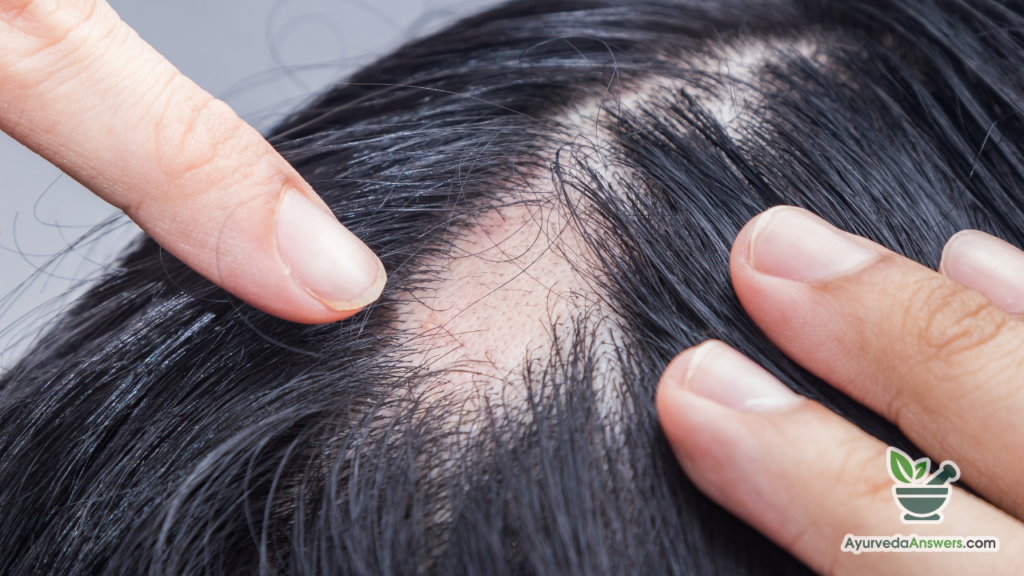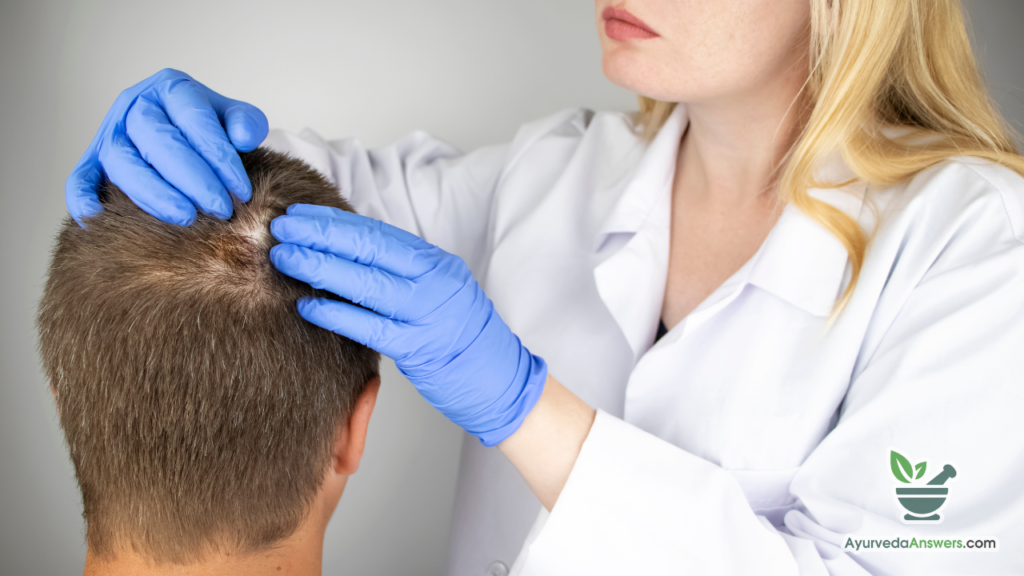
In the intricate tapestry of our being, our hair stands as a crown of vitality and beauty. However, when the unwelcome visitor of alopecia areata arrives, it can leave us grappling with the loss of our cherished locks. Fear not, for Ayurveda, the ancient science of life, offers a gentle and holistic approach to address alopecia areata and nurture hair health from within.
Let us embark on a journey through the soothing remedies, nurturing practices, and timeless wisdom of Ayurveda to restore the lushness of our mane and embrace radiant hair once more.
Understanding Alopecia Areata through an Ayurvedic Lens 🌿
Alopecia areata, known as “Indralupta” or “Khalitya” in Ayurveda, is a common autoimmune condition that causes hair loss in small, round patches on the scalp. This condition occurs when the immune system mistakenly attacks the hair follicles, leading to inflammation and hair loss.
While the exact cause of alopecia areata remains unknown, Ayurveda attributes it to imbalances in the doshas (Vata, Pitta, and Kapha) and disturbances in the body’s vital energies.

What is Alopecia Areata? 🤔
Alopecia areata manifests as sudden, patchy hair loss on the scalp, eyebrows, eyelashes, or other areas of the body. Common symptoms of alopecia areata include:
- Small, round patches of hair loss on the scalp or other areas of the body
- Smooth, bald patches without visible signs of inflammation or scarring
- Excessive shedding of hair from affected areas
- Spontaneous regrowth of hair in some cases
- Nail abnormalities such as pitting or ridges in severe cases
Causes of Alopecia Areata According to Ayurveda 🌱
Ayurveda identifies several factors that can contribute to the development of alopecia areata:

- Imbalanced Doshas: Imbalances in the doshas, particularly excess Pitta and Vata doshas, can disrupt the normal functioning of the hair follicles and lead to hair loss.
- Impaired Digestion: Poor digestion and metabolism can result in the accumulation of toxins (ama) in the body, which can compromise the nourishment of the hair follicles and contribute to hair loss.
- Stress and Anxiety: Emotional stress, anxiety, and psychological factors can aggravate imbalances in the doshas and trigger autoimmune responses that lead to hair loss.
- Genetic Predisposition: A family history of alopecia areata or other autoimmune conditions may increase the risk of developing the condition.
- Environmental Factors: Exposure to environmental toxins, pollutants, and harsh chemicals in hair care products can damage the hair follicles and contribute to hair loss.
Prevention: Nurturing Hair Health Naturally 🌟
Prevention is key to managing alopecia areata and promoting healthy hair growth. Ayurveda offers holistic strategies to prevent hair loss and nurture hair health naturally:

- Balanced Diet: Follow a balanced diet that includes nourishing foods rich in vitamins, minerals, and antioxidants essential for hair health. Include plenty of fresh fruits, vegetables, whole grains, nuts, seeds, lean proteins, and healthy fats in your diet.
- Scalp Care: Maintain a clean and healthy scalp by washing your hair regularly with mild, natural shampoos and avoiding harsh chemicals and synthetic ingredients. Massage your scalp with herbal oils such as coconut oil, almond oil, or Brahmi oil to nourish the hair follicles and promote circulation.
- Stress Management: Practice stress-reducing techniques such as yoga, meditation, deep breathing exercises, and relaxation to calm the mind, reduce stress, and balance the doshas.
- Gentle Hair Care: Avoid harsh hair treatments, excessive heat styling, tight hairstyles, and chemical-laden hair products that can damage the hair follicles and contribute to hair loss. Opt for gentle, natural hair care products and treatments that support the health of your hair and scalp.
Treatment: Restoring Hair Growth with Ayurvedic Remedies 🌸
In addition to prevention, Ayurveda offers gentle and effective remedies to treat alopecia areata and promote hair growth:

- Herbal Oils: Apply herbal oils containing hair-strengthening and nourishing herbs such as Bhringraj, Brahmi, Amla, Neem, and Jatamansi to the scalp and affected areas to stimulate hair growth, improve circulation, and nourish the hair follicles.
- Ayurvedic Formulations: Take herbal supplements or formulations containing hair-friendly herbs such as Triphala, Ashwagandha, Shatavari, and Guduchi to support hair health, balance the doshas, and strengthen the immune system.
- Scalp Treatments: Undergo Ayurvedic scalp treatments such as Shirodhara (oil pouring therapy), Shirobasti (oil pooling therapy), and Nasya (nasal therapy) to nourish the scalp, improve blood circulation, and promote hair growth.
- Dietary Recommendations: Follow a hair-friendly diet that includes foods rich in iron, protein, vitamins A, C, and E, zinc, and omega-3 fatty acids to support hair growth and nourish the hair follicles. Include foods such as leafy greens, legumes, nuts, seeds, eggs, fish, and dairy products in your diet.
Conclusion:
In the tapestry of our lives, our hair serves as a symbol of vitality, beauty, and identity. With Ayurveda as our guiding light, we embark on a journey to restore the lushness of our mane and embrace radiant hair once more.
Let us nurture our hair with the gentle remedies, nurturing practices, and timeless wisdom of Ayurveda, as we awaken to the beauty of natural balance and vitality, and reclaim the glory of our locks with grace and gratitude. 🌸
Disclaimer : The techniques described in these articles are not intended as substitutes for professional medical advice or treatment. Consult a physician before trying any new health treatment. Do not stop or change prescribed medications without consulting your healthcare provider. The information provided is for educational purposes only. Results will vary based on individual factors. Always rely on the guidance of a qualified medical professional for any health concerns.
Read Our Latest Articles:
- Ayurveda for Disc Bulge: Finding Relief Naturally
- Ayurveda for Alopecia Areata: Nurturing Hair Health Naturally
- Ayurveda for Asthma: Breathe Easy with Natural Solutions
- Ayurveda for Melasma: Embracing Natural Solutions for Clear, Radiant Skin
- Ayurveda for Dampness in the Body: Embracing Balance and Vitality
Leave a Reply